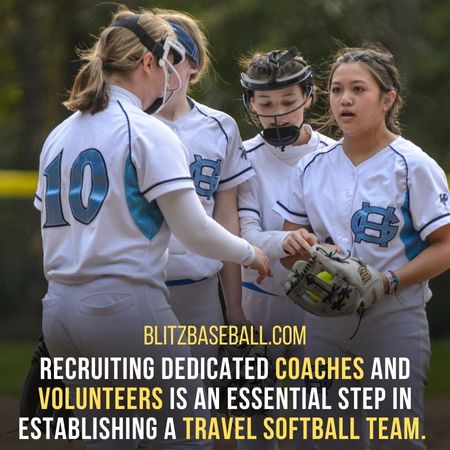Starting a travel softball team requires careful consideration and planning. This article aims to provide an informative guide on the key aspects to consider and how to start a travel softball team.
The intense nature of travel softball necessitates higher skill levels and dedication from players. Understanding the age groupings in softball and placing players on appropriate teams is crucial.
Recruiting dedicated coaches and volunteers is vital for player development. Creating a budget and financial plan, including fundraising campaigns and sponsorships, is necessary to cover expenses such as travel, tournament fees, and equipment costs.
Clear communication of pricing structure is important for parents, as player registration fees serve as the primary source of revenue for fundraising. Advertising and recruiting new members are essential for the team’s success.
Fundraising activities and networking with local athletic organizations can help mitigate expenses and promote the team. Additionally, proper equipment, softball apparel, and insurance are necessary for player safety.
By following these considerations, individuals can successfully establish and maintain a travel softball team.
Key Takeaways
- Travel softball requires higher skill levels, dedication, and playtime.
- Creating a budget and financial plan for the team is crucial for success.
- Fundraising and sponsorships can help mitigate travel softball expenses.
- Equipment and apparel should be prioritized for safety and team unity.
Overview of Travel Softball
Travel softball is a highly competitive form of softball that involves selecting a smaller number of players, participating in weekend tournaments, and requiring higher skill levels and dedication compared to traditional softball.
In travel softball, teams typically consist of 10-12 players who are chosen by coaches based on their skill level and potential. These players are given opportunities to excel and reach higher levels of play.
Travel softball also emphasizes player development, with coaches playing a significant role in honing the skills and abilities of the players.
It is important to note that travel softball may not be the ideal decision for every player, as it requires preparation and hard work. However, for those who are dedicated and passionate about the sport, travel softball can provide a platform for growth and success.
How To Start A Travel Softball Team
Recruiting dedicated coaches and volunteers is an essential step in establishing a travel softball team. These individuals play a crucial role in the development and success of the team.

It is important to find coaches who have a passion for the sport and are willing to dedicate their time and expertise to train and guide the players. Volunteers can also contribute significantly by assisting with various team activities, such as organizing practices, coordinating tournaments, and providing support during games.
Additionally, player registration fees play a vital role in funding the team’s expenses. Clear communication of the pricing structure is important for parents to understand the financial commitment involved. These fees typically serve as the primary source of revenue for fundraising efforts and help cover costs such as travel expenses, tournament fees, and equipment.
By recruiting dedicated coaches and establishing reasonable player registration fees, a travel softball team can set a strong foundation for success.
Fundraising and Sponsorships
Fundraising and sponsorships are essential for covering the expenses of a travel softball team. They can be achieved through various activities and partnerships with local businesses.
Sponsorship campaigns can be initiated to seek support from companies in the community. This involves approaching local businesses and organizations and presenting them with opportunities to contribute financially or provide resources for the team.
Creative fundraising ideas can also be implemented, such as organizing car washes, flower sales, or golf tournaments. These activities not only raise funds but also promote community involvement and engagement.
Successful fundraising campaigns can alleviate the financial burden on individual players and their families. This allows the team to hire top coaches for clinics and provide necessary equipment and apparel.
By actively seeking sponsorships and implementing creative fundraising strategies, travel softball teams can ensure the financial stability and success of their program.
Equipment and Apparel
In order to ensure player safety and proper team representation, travel softball teams must acquire appropriate equipment and apparel. Injury prevention should be a top priority for teams, as injuries are common in the sport.
Competent trainers should be present during games and practices and keep first aid kits supplied. Additionally, teams should have insurance coverage for injuries that may occur.
Uniform customization is another important aspect of equipment and apparel. Players often prefer selecting their favorite jersey numbers and having their surnames displayed on the back of their jerseys.
This not only adds a sense of personalization but also creates a sense of unity within the team. It is also recommended to have the same brand and model of cleats for all players to further enhance team unity.
Trainers should also have proper apparel such as jerseys and caps to maintain a professional appearance. By prioritizing player safety and customizing uniforms, travel softball teams can create a positive and cohesive team environment.

Minimum Standards of Performance (MSP)
Minimum Standards of Performance (MSPs) outline specific skills and techniques that players at different age levels in travel softball should focus on developing. These MSPs serve as a guideline to assess skill development and ensure that players are progressing appropriately.
For 8U and 10U age groups, the MSPs include fundamental skills such as throwing, catching, baserunning, hitting, and sliding.
As players move up to the 12U age group, the focus expands to include more advanced techniques in throwing, catching, running, hitting, and sliding.
By the 14U age group, MSPs involve further improvements in positional throwing, catching, base running, hitting, and sliding.
These MSP evaluations allow coaches to identify areas of improvement and tailor their training programs accordingly, ensuring that players are equipped with the necessary skills to excel in travel softball.
Promotion and Communication
Transitioning from the Minimum Standards of Performance (MSP) to the current subtopic of Promotion and Communication, it is important to consider how to effectively promote a travel softball team.
One effective strategy is to utilize social media platforms to create awareness and engage with potential players and parents. By creating accounts on popular platforms, such as Facebook, Instagram, and Twitter, teams can showcase their accomplishments, share updates on practices and games, and even recruit new members.
Additionally, networking with local athletic organizations, such as recreational softball programs, can help spread the word about the team and potentially attract interested players. Building relationships with these organizations can also provide a pool of talent for future recruitment.
Overall, a combination of social media promotion and networking with local organizations can greatly contribute to the success and growth of a travel softball team.
- Regularly update social media platforms with team accomplishments and updates
- Engage with followers through comments, messages, and liking posts
- Share photos and videos of practices, games, and team events
- Collaborate with local athletic organizations for cross-promotion and recruitment
- Utilize hashtags and geotags to reach a wider audience.
Game Logistics and Differences
Game logistics and differences in travel softball teams involve several key aspects:
Scheduling league games and tournaments: Travel softball teams must coordinate and schedule league games and tournaments, which often require traveling to different locations. These games and tournaments may need to be rescheduled if necessary.
Prioritizing attendance for practices and games: In travel softball, attendance is crucial for both practices and games. Players are expected to commit to regular practices and show up for every game. This level of dedication and commitment is higher compared to recreational softball or little league.
Recognizing the differences in time commitment and competition level: Travel softball requires a greater time commitment from players and their families. The competition level is also higher, with a focus on skill development and better games. In contrast, recreational softball and little league are typically more low-stakes, low-cost, and less competitive.
Little League Softball: Little League Softball offers a fun learning experience for young players. It provides an opportunity for children to develop their skills in a supportive and less competitive environment.
Travel softball: Travel softball takes place throughout the year, with club practices and weekend competitions. These weekend trips often involve multiple games. Winners are determined through double-elimination bracket play, adding an extra level of competitiveness to the games.

Frequently Asked Questions
What are the benefits of playing travel softball compared to recreational softball?
Playing travel softball offers benefits such as enhanced skill development and increased competition compared to recreational softball. It provides players with opportunities to excel, reach higher levels, and participate in intense weekend tournaments, fostering growth and improvement in their abilities.
How can former players contribute to starting a new travel softball team?
Former players can contribute to starting a new travel softball team by serving as role models for athletes, assisting in recruiting new members, and sharing their expertise and experiences. Their involvement enhances team development and fosters a sense of camaraderie.
What are some effective fundraising activities for travel softball teams?
Some effective fundraising strategies for travel softball teams include organizing car washes, flower sales, and golf tournaments. Community involvement is crucial for the success of these activities and can help mitigate team expenses.
How can networking with local athletic organizations help promote a travel softball team?
Networking with local athletic organizations can provide advantages in promoting a travel softball team. Local partnerships can help attract interested players, increase visibility through word-of-mouth, and potentially collaborate on events or resources to enhance the team’s exposure in the community.
What are the key differences between travel softball and little league softball in terms of time commitment and competition level?
Travel softball requires a higher time commitment compared to little league softball, as it involves year-round club practices and weekend competitions. Additionally, travel softball offers a higher competition level with more intense games and better quality of play.
Conclusion
In conclusion, starting a travel softball team requires careful planning and consideration.
Firstly, it is important to understand the age groupings in softball and place players accordingly.
Recruiting dedicated coaches and volunteers is crucial for player development.
Creating a budget and financial plan, including fundraising campaigns and sponsorships, is necessary to cover expenses.
Clear communication of pricing structure is important for parents.
Advertising and recruiting new members is essential.
Proper equipment, apparel, and insurance are necessary for player safety.
Networking with local athletic organizations and utilizing social media can help promote the team’s success.
